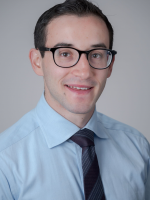
Student Profiles

1 Search Results

Nicholas Pasternack
NIH Cambridge Scholar MD/PhD
B.S. Psychology, University of Florida, 2016
MSc Neuroscience, University of Oxford, 2017
M.D., University of Alabama at Birmingham School of Medicine (In progress)
Dr. Avindra Nath (NINDS) and
Prof. Ole Paulsen (Cambridge)
Neuroscience, Neurodegeneration, Neurovirology
Nick first decided to pursue medicine and neuroscience when he was a high school student in Sarasota, Florida. He attended a lecture at his local hospital where a neurosurgeon demonstrated how deep brain stimulation (DBS) was used to treat a Parkinson’s disease (PD) patient. Witnessing the instantaneous cessation of the patient’s resting tremor upon activation of the stimulator left a lasting impression on Nick and convinced him to pursue medicine and neuroscience research as an undergraduate at the University of Florida (UF) Honors Program. The summer before his first year at UF, Nick secured a research position at the McKnight Brain Institute (MBI) at UF. Nick worked with Dr. Florian Siebzehnrubl and Dr. Loic Deleyrolle in the Department of Neurosurgery where he studied glioblastoma, the most common and lethal form of brain cancer. Nick’s research on glioblastoma developed into his senior thesis project where he demonstrated that glioblastoma cells expressing the transcription factor Zeb1 preferentially form a compartment of glioblastoma cells that rebound from radiation therapy. Nick’s thesis project unanimously received Highest Honors by his Thesis Committee, and he graduated Summa Cum Laude from UF. After graduating from UF, Nick was selected to be a Frost Scholar to complete his MSc in neuroscience at Exeter College, University of Oxford. During this time, Nick completed two theses: for the first, Nick worked with Dr. Tommas Ellender in the Department of Pharmacology and uncovered the importance of a specific neural progenitor cell in determining the neural circuitry of the basal ganglia, a brain region involved in motor function. For the second, Nick worked with Prof. Stephanie Cragg in the Department of Physiology, Anatomy and Genetics and determined that deficits in dopamine neurotransmission could be seen more than a year before motor impairments and cell death in a mouse model of PD.
Nick’s long term career goal is to become a physician-scientist specializing in treating patients with neurodegenerative diseases in the clinic and developing novel treatments to stop the process of neurodegeneration in the lab. Towards this goal, Nick has completed his second year of medical school at Virginia Commonwealth University School of Medicine and is looking forward to starting his PhD at the University of Cambridge as an NIH Cambridge Trust Scholar. The focus of his thesis project will be on understanding virally-mediated origins of neurodegeneration in an amyotrophic lateral sclerosis (ALS) mouse model.


